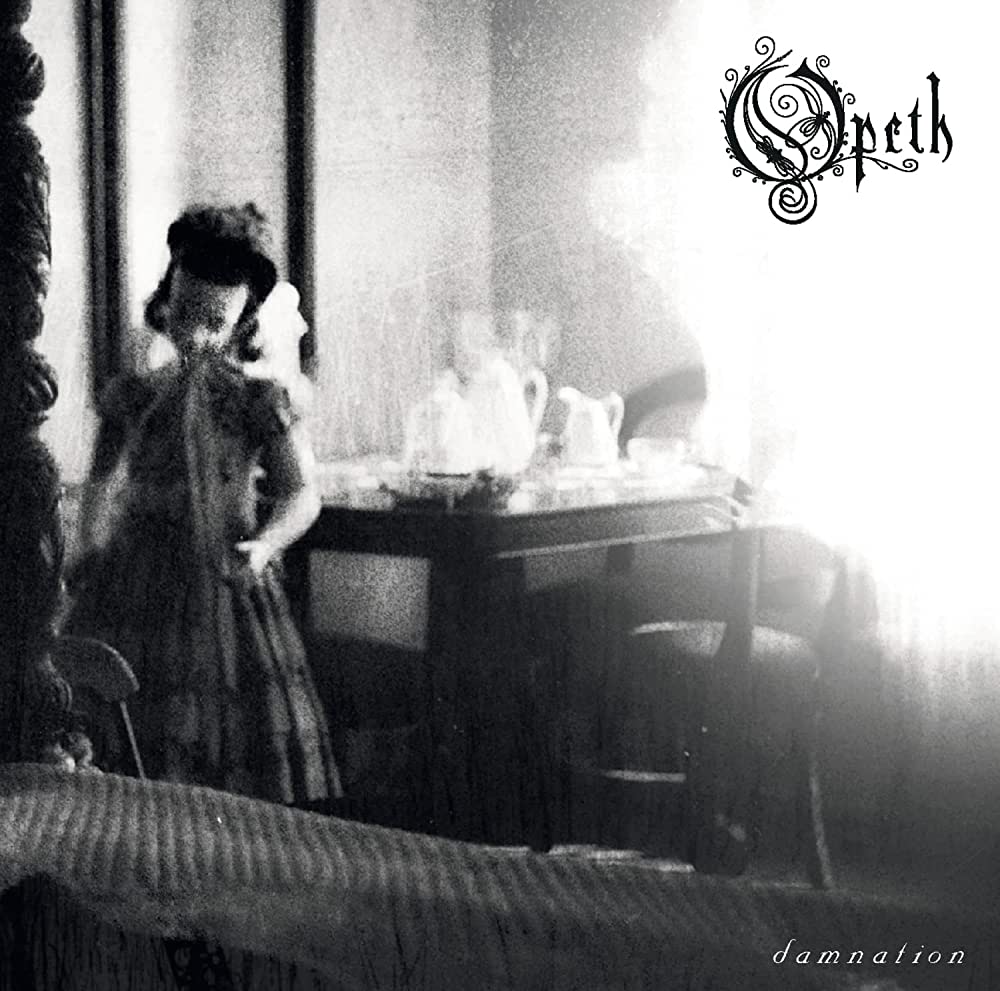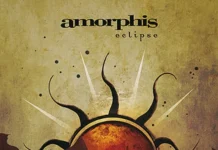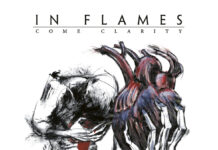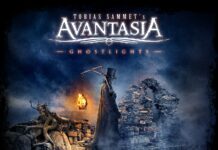Sandwiched between two absolutely stellar masterpieces of progressive death metal – the albums, “Blackwater Park” (2001) and “Ghost Reveries” (2005), respectively – the in-between twin efforts that OPETH initially wanted to release as a double album, “Deliverance” (2002) and “Damnation” (2003), seem as though they were somewhat overshadowed by those two behemoths. This year, it is the latter’s turn to celebrate its 20th anniversary, so it’s only appropriate to give it a few spins and reflect upon its rich, acoustic, and proggy textures. After all, of these two peculiar albums, it was “Damnation,” with its radical departure from the band’s signature brutal oeuvre, which cautiously hinted at the direction the band would be heading deeper and deeper into in future albums to come. Released on April 22nd, 2003, via the Music For Nation label, 5 months after “Deliverance” in spite of having been recorded first in those trouble-plagued sessions, this endeavor was the seventh studio album by OPETH. It was also the first in which these black-garbed metal sages indulged in the vintage prog aesthetic with reckless abandon, what with lush Mellotron washes, Gilmourian guitar solos, and frontman Mikael Åkerfeldt discarding his legendary ogre vocals altogether. “Damnation” was one of those OPETH albums produced by Steven Wilson in the early 2000s – a fact which has later inspired a whole gamut of speculation, not to mention funny memes, about the extent to which Wilson might have acted as some sort of Svengali, alluring the OPETH crew further and further away from their sinister metal roots and more towards the folksy, symphonic prog of the 1970s.

Some fans like to think that there is an overarching theme to this album, albeit it obviously isn’t a concept album in the vintage-prog sense of the term. The view is that “Damnation” is an album about death. Now, as I reflect upon these tracks from this standpoint, there actually might be a ring of truth to this claim. Åkerfeldt did dedicate this album to his grandmother, who died during the recording sessions. Befittingly, the opener, “Windowpane” is a plaintive, somewhat waltz-y tune about a ghost watching over his family and friends, who are unable to see him or respond to his gestures, as referred to in the lyrics, “His hand is waving a goodbye, there’s no response or action returned.” The verses have more than a good ounce of CAMEL vibes, what with the swinging guitar motif bouncing in mellow triple meter. The emotive overall moodiness, however, sets the song rather poignantly apart from the majority of those old-school folk-prog efforts. I mean, the stuff from the 1970s resonates with the air of, say, the Harry Potter franchise, whereas “Windowpane” sounds more like the creepy and haunting feature film, The Orphanage, produced by Guillermo Del Toro.
One of the highlights of the outing is “In My Time of Need,” which is a nice cross between the sounds of KATATONIA and PINK FLOYD. The song is like a flimsy night walk through the dark forests of vintage prog, yet charged with the gloomy atmosphere of heavy metal. This song serves as a fine example of how sometimes less is indeed more; the arrangement is very sparse and the sense of drama is created with very subtle means. When it comes to the meaning of the lyrics, quite a few fans seem to have interpreted that the song talks about suicidal thoughts – perhaps prompted by a romantic relationship gone by the wayside. Then again, the beauty of music comes from the fact that everyone can pour their own meaning into the lyrics. (For all I know, the lyrics could be about a shampoo brand – it is known to have happened in the past, you know.)
Other highlights are songs such as “Closure,” with its prominent Middle-Eastern vibes, “Hope Leaves,” which takes a subtle nod toward PORCUPINE TREE, and “To Rid the Disease,” what with the Mellotron washes resonating thick with the air of MOODY BLUES and the like. In the latter case, rumor has it that the vocal melody in the chorus is actually borrowed from a track recorded by Åkerfeldt‘s side project at the time, SÖRSKOGEN. Whatever the case, the song does capture the spirit of those early prog endeavors from the 1960s and 1970s rather nicely.
It is perhaps pointless to single out highlights of this album, because each song is a haunting piece of work, really. Åkerfeldt‘s undying love for CAMEL, for instance, shines through the most in “Ending Credits.” In fact, on the “Lamentations” DVD, staying true to his inner comedian, he introduces the song as being a rip-off of CAMEL. Not even the robust, Gilmourian guitar solos manage to dissolve the underlying mood, which owes a good deal of its charm to the 1975 album, “Music Inspired by The Snow Goose,” by these unsung heroes of the British prog movement from yesteryear.
The jazzy and atmospheric flourishes, in turn, get the strongest on songs such as “Death Whispered a Lullaby” and the album closer, “Weakness.” The former side-steps cautiously in the post-rock realm even, and the Leslie-soaked Rhodes piano in the closer couldn’t possibly have been further from the band’s signature prog-metal aesthetic of the time. I am such a late-comer in the parish of die-hard OPETH fanboys, having not found their dark magic until 2005, so I wouldn’t know how this effort went down among the prog-metal crowd of the era. One thing I’m pretty sure about though: perhaps much to the chagrin of the trve-kvlt metalheads with an inclination for some progressive flavor, “Damnation” sure put an end to the debate about whether OPETH should be canonized in the pantheon of progressive rock and metal or not. A few years later, when I found them through their haunting monolith of an album, “Blackwater Park,” the prog crowd already spoke with reverence of these Swedes as equals to the elder gods from time immemorial.
So, long story short, “Damnation” is not only a must-have album for every OPETH fanboy, but it is a prog classic that should be included in the music collection of anyone who claims to listen to progressive rock or metal – yes, regardless of the fact that metal plays a very minor role in this selection.
Written by Jani Lehtinen
Tracklist
- Windowpane
- In My Time of Need
- Death Whispered a Lullaby
- Closure
- Hope Leaves
- To Rid the Disease
- Ending Credits (instrumental)
- Weakness
Lineup
Mikael Åkerfeldt – vocals, lead guitars
Peter Lindgren – rhythm guitars
Martin Méndez – bass guitars
Martin Lopez – drums
+ Steven Wilson featuring additional keyboards and backing vocals
Label
Koch / Music For Nations





